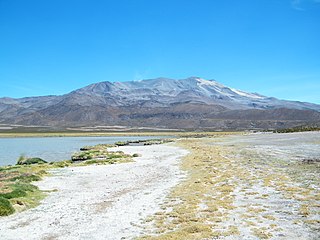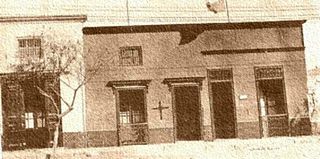| |||||
| Decades: | |||||
|---|---|---|---|---|---|
| See also: | |||||
The following lists events that happened during 2005 in Chile.
| |||||
| Decades: | |||||
|---|---|---|---|---|---|
| See also: | |||||
The following lists events that happened during 2005 in Chile.

The history of Peru spans 15 millennia, extending back through several stages of cultural development along the country's desert coastline and in the Andes mountains. Peru's coast was home to the Norte Chico civilization, the oldest civilization in the Americas and one of the six cradles of civilization in the world. When the Spanish arrived in the sixteenth century, Peru was the homeland of the highland Inca Empire, the largest and most advanced state in pre-Columbian America. After the conquest of the Incas, the Spanish Empire established a Viceroyalty with jurisdiction over most of its South American domains. Peru declared independence from Spain in 1821, but achieved independence only after the Battle of Ayacucho three years later.

Alberto Kenya Fujimori Inomoto was a Peruvian politician, professor, and engineer who served as the 54th president of Peru from 1990 to 2000. Of Japanese descent, Fujimori was an agronomist and university rector before entering politics. Generally recognized as a civilian-military dictatorship, his government was characterized by its use of propaganda, widespread political corruption, and human rights violations.

Peru, officially the Republic of Peru, is a country in western South America. It is bordered in the north by Ecuador and Colombia, in the east by Brazil, in the southeast by Bolivia, in the south by Chile, and in the south and west by the Pacific Ocean. Peru is a megadiverse country, with habitats ranging from the arid plains of the Pacific coastal region in the west, to the peaks of the Andes mountains extending from the north to the southeast of the country, to the tropical Amazon basin rainforest in the east with the Amazon River. Peru has a population of over 32 million, and its capital and largest city is Lima. At 1,285,216 km2 (496,225 sq mi), Peru is the 19th largest country in the world, and the third largest in South America.
University of Tarapacá is a university in Arica, Chile. It is a derivative university part of the Chilean Traditional Universities. The university publishes Revista Chungará a journal on anthropology and archaeology.

Iquique is a port city and commune in northern Chile, capital of both the Iquique Province and Tarapacá Region. It lies on the Pacific coast, west of the Pampa del Tamarugal, which is part of the Atacama Desert. It has a population of 191,468 according to the 2017 census. It is also the main commune of Greater Iquique. The city developed during the heyday of the saltpetre mining in the Atacama Desert in the 19th century. Once a Peruvian city with a large Chilean population, it was conquered by Chile in the War of the Pacific (1879–1883). Today it is one of only two free ports of Chile, the other one being Punta Arenas, in the country's far south.

The People's New Party was a Japanese political party formed on August 17, 2005, in the aftermath of the defeat of Prime Minister Junichiro Koizumi's Japan Post privatisation bills which led to a snap election. On March 21, 2013, party leader Shozaburo Jimi announced that he was disbanding the party.

Keiko Sofía Fujimori Higuchi is a Peruvian politician. Fujimori is the eldest daughter of former Peruvian president Alberto Fujimori and Susana Higuchi. From August 1994 to November 2000, she held the role of First Lady of Peru, during her father's administrations. She has served as the leader of the Fujimorist political party Popular Force since 2010, and was a congresswoman representing the Lima Metropolitan Area, from 2006 to 2011. Fujimori ran for president in the 2011, 2016, and 2021 elections, but was defeated each time in the second round of voting.

Isluga is a stratovolcano located in Colchane, 7 kilometres (4.3 mi) west of the Chile-Bolivia border and at the west end of a group of volcanoes lined up in an east-west direction, which also includes the volcanoes Cabaray and Tata Sabaya. Isluga has an elongated summit area and lies within the borders of Volcán Isluga National Park in Chile's Tarapacá Region.

The Tacna–Arica compromise or Treaty of Lima was a series of documents that settled the territorial dispute of both Tacna and Arica provinces of Peru and Chile respectively. According to the Treaty, the Tacna-Arica Territory was divided between both countries; Tacna being awarded to Peru and with Chile retaining sovereignty over Arica. Chile also agreed to pay up to US$6 million in compensation to Peru. The Treaty was signed on 3 June 1929 in Lima by then-Peruvian Representative Pedro José Rada y Gamio and Chilean Representative Emiliano Figueroa Larrain.

Tarapacá is a town and municipality in the Colombian Department of Amazonas. As of 2015, the population comprised 4,195 people.

Former Peruvian President Alberto Fujimori was arrested, tried, and convicted for a number of crimes related to corruption and human rights abuses that occurred during his government. Fujimori was president from 1990 to 2000. His presidency ended when he fled the country in the midst of a scandal involving corruption and human rights violations.

Popular Force, known as Force 2011 until 2012, is a right-wing populist and Fujimorist political party in Peru. The party is led by Keiko Fujimori, former congresswoman and daughter of former President Alberto Fujimori. She ran unsuccessfully for the presidency in the 2011, 2016 and 2021 presidential elections, all losing by a narrow margin.
The Fall of Fujimori is a 2005 documentary film about Peruvian President Alberto Fujimori, who fled the country for Japan in 2000 to avoid facing 21 charges of corruption, murder and human rights abuses. Then, five years later, Fujimori flew into Chile and declared his intention of once again running for president in 2006. He was promptly arrested.
The 2005 Tarapacá earthquake occurred on June 13 at 22:44:33 UTC. Its epicenter was located near Mamiña, in northern Chile about 125 km east-northeast of Iquique, affecting the Tarapacá Region and adjacent parts of Bolivia. It had a magnitude of Mw 7.8 and a maximum felt intensity of VII on the Mercalli intensity scale.

Fujimorism is the policies and the political ideology of former President of Peru Alberto Fujimori as well as the personality cult built around him, his policies and his family, especially Keiko Fujimori. The ideology is defined by authoritarianism, its support for neoliberal economics, opposition to communism, and socially and culturally conservative stances such as opposition to LGBT rights and school curriculums including gender equality or sex education. Opponents of Fujimorism are known as anti-Fujimorists.

The Chilenization of Tacna, Arica, and Tarapacá was a process of forced transculturation or acculturation in the areas which were invaded and incorporated by Chile since the War of the Pacific (1879–1883). The aim of the Chilenization was to create a dominance of Chilean traditions and culture in that region, in preference to those of the Peruvian population. The British desire to reunite all saltpeter mines under one political administration was also a major factor that influenced the outcome of the war.

Ramón Briones Luco (1872–1949) was a Chilean lawyer and radical politician. He was born in Chimbarongo on 6 December 1872 and died in Johannesburg on 16 August 1949. He was the son of Francisco Javier Arriagada and Doña Lucinda Briones Luco Avaria. He married Camila Carvajal Miranda.
The following lists events that happened during 2006 in Chile.

San Lorenzo de Tarapacá, also known simply as Tarapacá, is a town in the region of the same name in Chile.

Elías Lafertte Gaviño was a Chilean worker in saltpeter mining and a communist politician. Lafertte ran in the 1931 and 1932 presidential elections ending in third and fifth place. He was senator from 1937 to 1953.